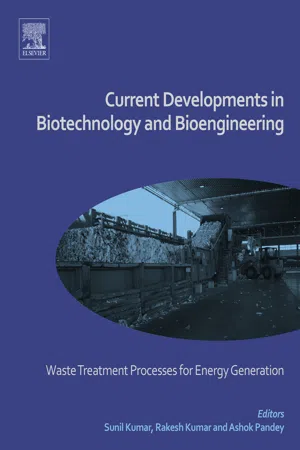
Current Developments in Biotechnology and Bioengineering
Waste Treatment Processes for Energy Generation
- 382 pages
- English
- ePUB (mobile friendly)
- Available on iOS & Android
Current Developments in Biotechnology and Bioengineering
Waste Treatment Processes for Energy Generation
About This Book
Current Developments in Biotechnology and Bioengineering: Waste Treatment Processes for Energy Generation provides extensive research on the role of waste management processes/technologies for energy generation. The enormous increase of waste materials generated by human activity and its potentially harmful effects on the environment and public health have led to an increasing awareness of an urgent need to adopt scientific methods for the safe disposal of wastes. This book outlines the basic knowledge, processes and technologies for the generation of energy from waste and functions as an important reference for academics and practitioners at varying levels of interest and knowledge.
The book's content encompasses all issues for energy recovery from waste in a very clear and simple manner, acting as a comprehensive resource for anyone seeking an understanding on the topic.
- Outlines the latest technologies used for waste conversion into energy and facilitates project evaluation based on these technologies
- Summarizes the pros and cons of various processes
- Includes case studies and economic analysis
Frequently asked questions
Information
Current Developments in Biotechnology and Bioengineering and Waste Treatment Processes for Energy Generation
An Introduction
Abstract
Keywords
1. Introduction
Table of contents
- Cover image
- Title page
- Table of Contents
- Copyright
- List of Contributors
- Preface
- Chapter 1. Current Developments in Biotechnology and Bioengineering and Waste Treatment Processes for Energy Generation: An Introduction
- Chapter 2. Waste Legislation Across the Globe: An Overview
- Chapter 3. Global Status of Waste-to-Energy Technology
- Chapter 4. Waste Treatment Processes/Technologies for Energy Recovery
- Chapter 5. Biofuel Production From Biomass: Toward Sustainable Development
- Chapter 6. Landfill Gas as an Energy Source
- Chapter 7. Case Studies Around the World: Successful Stories and Challenges
- Chapter 8. Application of Geographic Information System in Energy Utilization
- Chapter 9. Promoting Waste-to-Energy: Nexus Thinking, Policy Instruments, and Implications for the Environment
- Chapter 10. The Concept of Energy-Efficient Residential Block Design
- Chapter 11. Energy-Aware Intelligence in Megacities
- Chapter 12. Waste-to-Energy Model/Tool Presentation
- Chapter 13. Aspen Plus Modeling Approach in Solid Waste Gasification
- Chapter 14. Energy From Waste: Future Prospects Toward Sustainable Development
- Chapter 15. Value Creation With Waste to Energy: Economic Considerations
- Chapter 16. Worldwide Business Models-Environmental and Financial Aspects
- Index